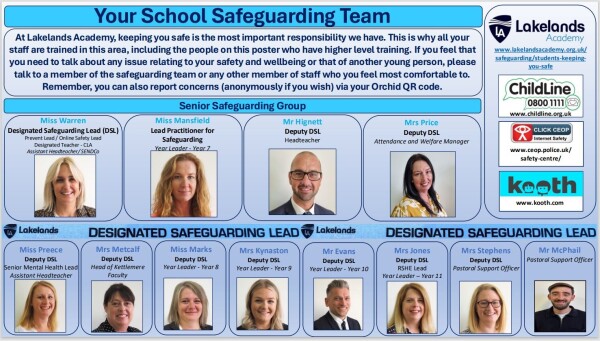Families - Keeping Your Child Safe
Safeguarding
KCSiE (Keeping Children Safe in Education) defines safeguarding and promoting the welfare of children as:
• Providing help and support to meet the needs of children as soon as problems
emerge
• Protecting children from maltreatment, whether that is within or outside the
home, including online
• Preventing the impairment of children’s mental and physical health or
development
• Ensuring that children grow up in circumstances consistent with the provision of
safe and effective care• Taking action to enable all children to have the best outcomes.
Child protection is part of this definition and refers to activities undertaken to protect specific children who are suspected to be suffering, or likely to suffer, significant harm. This includes harm that occurs inside or outside the home, including online.
Keeping Your Child Safe
Safeguarding is the absolute priority at Lakelands Academy and is embedded into all aspects of our school. We are committed to keeping children safe both inside and outside of school and have staff (Designated Safeguarding Leads) who are trained to deal with issues relating to safeguarding and child protection. Our students and staff know who these people are as the information is highly visible around our building. In addition, all of our staff receive regular safeguarding training.
We take seriously our duty of care to all staff, pupils and families. The aim of our child protection and safeguarding policy is to promote welfare and make all within our school feel safe. We understand our community and its needs and shape our procedures to ensure that we can protect and care for our students and families. We respond to patterns in experience and data using our robust recording and tracking systems to inform actions, developments and whole school decisions.
We are committed to inter-agency working to keep children safe. Our ethos holds centrally the understanding that we must provide a caring, positive, safe and stimulating environment which promotes the social, physical and moral development of all.
Lakelands Academy will have regard for the statutory guidance from the Department for Education (DfE) issued under Section 175 of the Education Act 2002, the Education (Independent School Standards) Regulations 2014, and the Non-Maintained Special Schools (England) Regulations 2015. This policy has been developed in line with legal obligations, including, where applicable, the Human Rights Act 1998, the Equality Act 2010 and the Public Sector Equality Duty.
Lakelands Academy will adhere to the statutory guidance Working Together to Safeguard Children and Keeping Children Safe in Education (KCSIE). We will follow the DfE of What to do if you are Worried a Child is Being Abused – Advice for Practitioners. We recognise the NSPCC website also provides use additional information on abuse and neglect and what to look out for.
All child protection matters will be dealt with in line with the arrangements of Shropshire Safeguarding Community Partnership and West Midlands Child Protection and Safeguarding Procedures or, if relevant, the safeguarding partnership area children reside in or is under the care of.
If you have any concerns about the safety of a child at Lakelands Academy then please contact one of our Designated staff listed below. If it is outside of school hours or during weekends or school holidays, please contact the First Point of Contact (FPOC), Children's Services and tell them your concerns; 0345 678 9021.
If you need to report concerns out of office hours then please contact the Emergency Social Work Team on 0345 678 9040 selecting option 1.
You can also speak to:
-
Protecting Vulnerable People (West Mercia Police): 0300 333 3000
-
NSPCC: 0800 800 5000
-
Childline: 0800 1111
If you believe a child or young person in Shropshire to be at immediate risk of harm or in need of emergency medical attention call the emergency services on 999.
The government publication Advice to parents and carers on keeping children safe from abuse and harm – GOV.UK (www.gov.uk) also provides information, advice and guidance that may be useful to you.
Communication with Parents
Our school will always discuss concerns with parents/carers and consent for any referrals should be sought unless to do so would:
-
Place the child at risk of significant harm or further risk of significant harm;
-
Place a vulnerable adult at risk of harm; and
-
Compromise any enquiries that need to be undertaken by children’s social care or the police.
The school will endeavour to ensure that parents have an understanding of the responsibilities placed on the school and staff for safeguarding children.
In the best interests of safeguarding children there may be occasions when the school has to consult with other agencies without a parent or carer’s prior knowledge. Our first concern and responsibility is the child’s welfare and we have a duty to protect children first and always. Such consultation may result in a formal referral which could prompt visits from social care and/or the police. We fully understand that this can be a very distressing set of circumstances. Our school will follow the procedures required by the Shropshire Safeguarding Community Partnership.
Our school will employ the services of an interpreter if required.
Curriculum
Child safety issues and child protection will be addressed through the curriculum where appropriate, especially through PSHE, Computing and E-Safety, Sex and Relations Education (SRE) and British values.
We use a variety of resources and approaches to teach the children how to keep themselves safe, build their resilience and manage risks.
The curriculum, and in particular the personal, social and health education development strand of the curriculum, includes an emphasis on relationships (relationships and sex education), building confidence and resilience in pupils and in developing preventative strategies to ensure their own protection and that of others. Opportunities are provided for pupils to develop the skills and strategies they need to stay safe from abuse, including age-appropriate discussions about healthy relationships, their bodies and being able to say no to requests that they do not want to carry out. Clear advice and guidance is built into the curriculum to ensure that pupils understand that there is a range of contacts they can turn to for advice and support and that they know where and how to report abuse.
Current Safeguarding Concerns
Child Criminal Exploitation
Child criminal exploitation (CCE) is where an individual or group takes advantage of an imbalance of power to coerce, control, manipulate or deceive a child into any criminal activity (a) in exchange for something the victim needs or wants, and/or (b) for the financial or other advantage of the perpetrator or facilitator and/or (c) through violence or the threat of violence. The victim may have been criminally exploited even if the activity appears consensual. CCE does not always involve physical contact; it can also occur using technology. CCE can include children being forced to work in cannabis factories, being coerced into moving drugs or money across the country (county lines) forced to shoplift or pickpocket, or to threaten other young people. Indicators of CCE can include a child:
· Appearing with unexplained gifts or new possessions
· Associating with other young people involved in exploitation
· Suffering from changes in emotional wellbeing
· Misusing drugs and alcohol
· Going missing for periods of time or regularly coming home late
· Regularly missing school or education
· Not taking part in education
Specific to the community of Ellesmere, TREES (Together Reducing & Ending Exploitation in Shropshire), have requested that we share the following information with our parents and carers:
“We want to inform parents in Ellesmere and surrounding areas of our increasing concerns around criminal activity, namely child exploitation, occurring in the Ellesmere area. These concerns are both echoed by Shropshire Local Authority and other statutory agencies. Child exploitation is a wider term used to describe criminal, sexual, financial, emotional activity where children and vulnerable persons can be coerced into criminal activity of the aforementioned varieties. In Ellesmere, we have seen increased drug-related activity and have put support in place for any individuals who have been affected by this. However, as a proactive measure, we ask that parents and carers remain vigilant around the signs and indicators of this type of behaviour and have linked information to support, educate and ensure we all do everything we can to keep our communities, and children, safe.
Shropshire Local Authority have a designated website which can be accessed via Child exploitation | Shropshire Council which explains in further detail our concerns and what you can do to support.
If you feel worried, concerned or wish to speak to the school regarding your child’s welfare in reference to what has been shared, please get in touch. Finally, we want to reinforce that child exploitation can happen to any child, regardless of background. Lakelands Academy and Shropshire Local Authority will always treat young people as victims of exploitation, as well as supporting parents and carers to get the right support without blame. Child exploitation is not unique to any area, school, or demographic, however can only reduce with the support of the community so we thankyou for your continued efforts.”
County Lines
County lines is when a young person is sent to sell drugs normally in a rural town. They get their train ticket paid for and are provided with a place to stay where they remain until the drugs are sold. They would then need to pass their earnings onto the drug dealer. In some situations they are mugged by the drug dealer and then owe the drug dealer the money that was stolen. This means it is very difficult to get out of the situation of having to go away to sell drugs.
Internet Safety
Children and young people spend lots of time on the internet. They may go online to research information for homework or to play games, chat with friends and make new ones. The internet holds a massive amount of useful information and can also be a really good way of learning about new things and keeping in contact with friends and family. It can also be a very dangerous place so it is important that children are protected and monitored when they are online.
CEOP (Child Exploitation and Online Protection) has lots of information about how to keep your children safe online and parental controls. The link to the website is CEOP – Thinkuknow
Childhood Mental Health
Mental illness and suicidal thoughts can affect anyone, of any age, of any background, at any time. It can be difficult to know if a child is suffering as they often keep it to themselves, but we know some characteristics for childhood mental health may be:
· Becoming withdrawn from family and friends
· Persistent low moods and unhappiness
· Tearfulness and irritability
· Worries that stop them carrying out day to day tasks
· Sudden outbursts of anger directed towards others or themselves
· Loss of interest in activities that they used to enjoy
· Problems eating or sleeping
Child-on-child Abuse
Abuse is abuse and should never be passed off as “banter”, “just having a laugh” or “part of growing up”. Child-on-child abuse is most likely to include, but may not be limited to:
· Bullying (including cyber-bullying, prejudice-based and discriminatory bullying)
· Abuse in intimate personal relationships between children (this is sometimes known as ‘teenage relationship abuse’)
· Physical abuse such as hitting, kicking, shaking, biting, hair pulling, or otherwise causing physical harm (this may include an online element which facilitates, threatens and/or encourages physical abuse)
· Sexual violence, such as rape, assault by penetration and sexual assault (this may include an online element which facilitates, threatens and/or encourages sexual violence)
· Sexual harassment, such as sexual comments, remarks, jokes and online sexual harassment, which may be standalone or part of a broader pattern of abuse
· Causing someone to engage in sexual activity without consent, such as forcing someone to strip, touch themselves sexually, or to engage in sexual activity with a third party
· Consensual and non-consensual sharing of nude and semi-nude images and/or videos (also known as sexting or youth produced sexual imagery)
· Upskirting, which typically involves taking a picture under a person’s clothing without their permission, with the intention of viewing their genitals or buttocks to obtain sexual gratification, or cause the victim humiliation, distress or alarm
· Initiation/hazing type violence and rituals (this could include activities involving harassment, abuse or humiliation used as a way of initiating a person into a group and may also include an online element)
Where children abuse their peers online, this can take the form of, for example, abusive, harassing, and misogynistic messages; the non-consensual sharing of indecent images, especially around chat groups; and the sharing of abusive images and pornography, to those who don't want to receive such content.
Domestic Abuse
Domestic abuse can broadly be defined as ‘any incident or pattern of incidents of controlling, coercive or threatening behaviour; violence or abuse between those aged 16 or over who have been intimate partners or family members. This can include, but is not limited to, the following types of abuse – psychological, physical, sexual, financial and emotional.’
Our school has been given the opportunity to take part in a national project (Operation Encompass), which is being run locally in partnership with Shropshire Council and West Mercia Police. Operation Encompass is a process whereby the police and the council will inform school if a child or young person has experienced any domestic abuse incident. This will be done prior to the start of the next school day. Information sharing between professional agencies allows school staff to provide emotional and practical support to their pupils experiencing domestic abuse.
The sharing of details under Operation Encompass is permitted under Statutory Safeguarding Legislation and in respect of local authority schools under the Crime and Disorder Act (for the prevention of crime) and doing so without the child’s or parent’s consent is permissible under both pieces of legislation and the General Data Protection Regulation (GDPR).
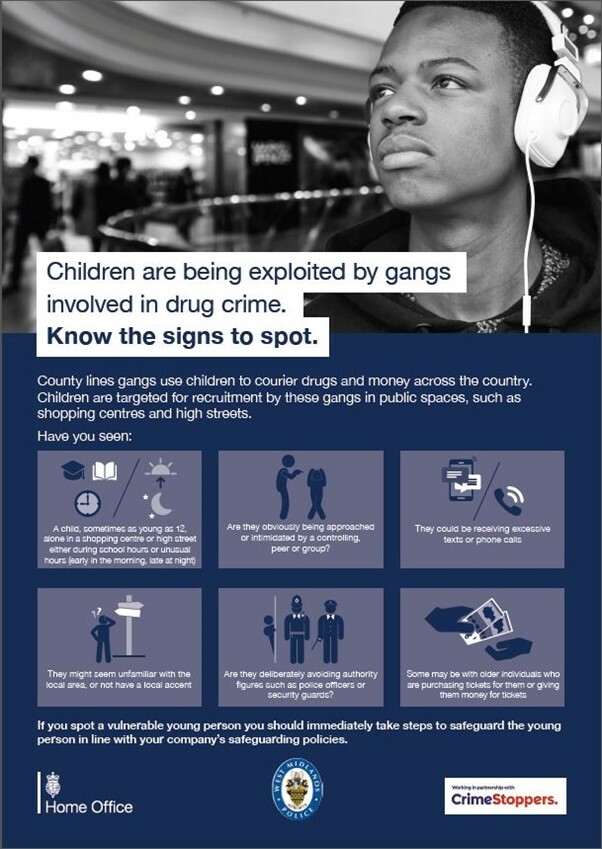

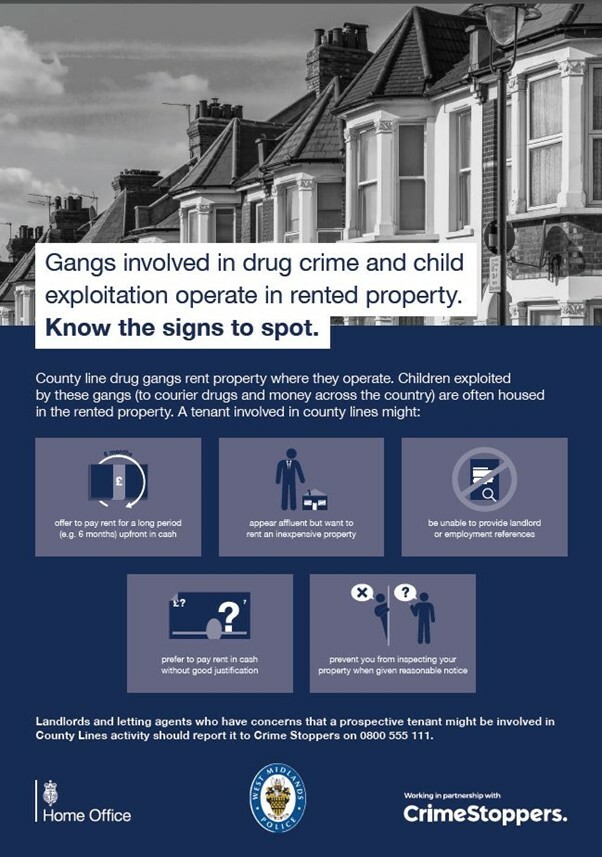
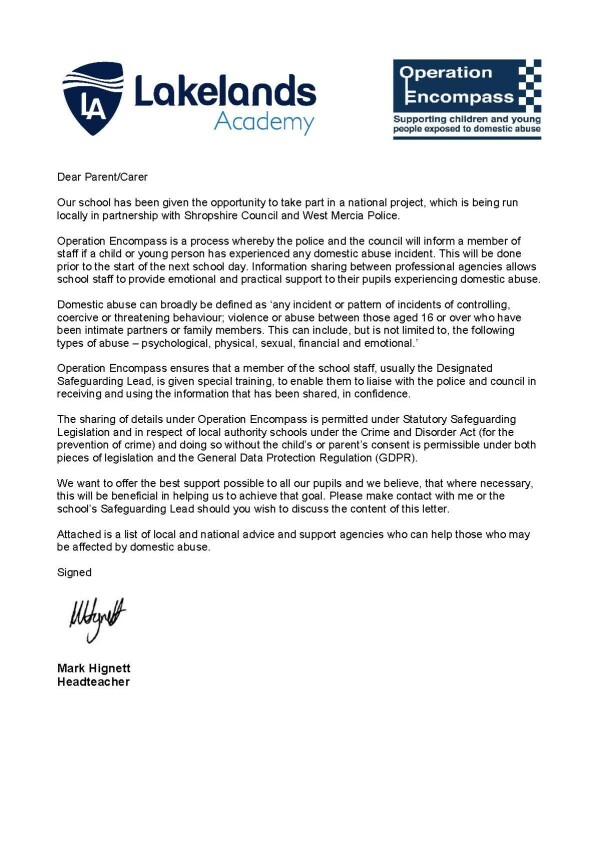
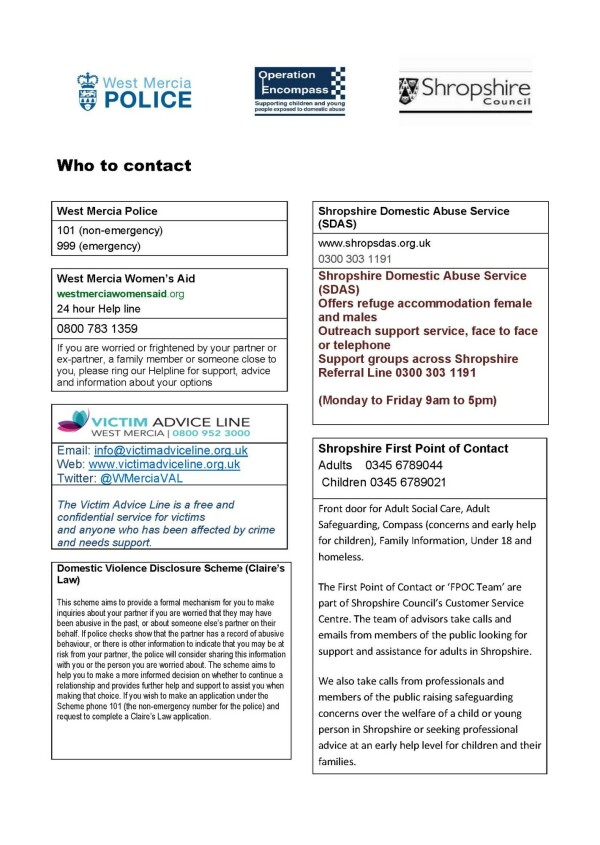

The Lakelands Safeguarding Team

